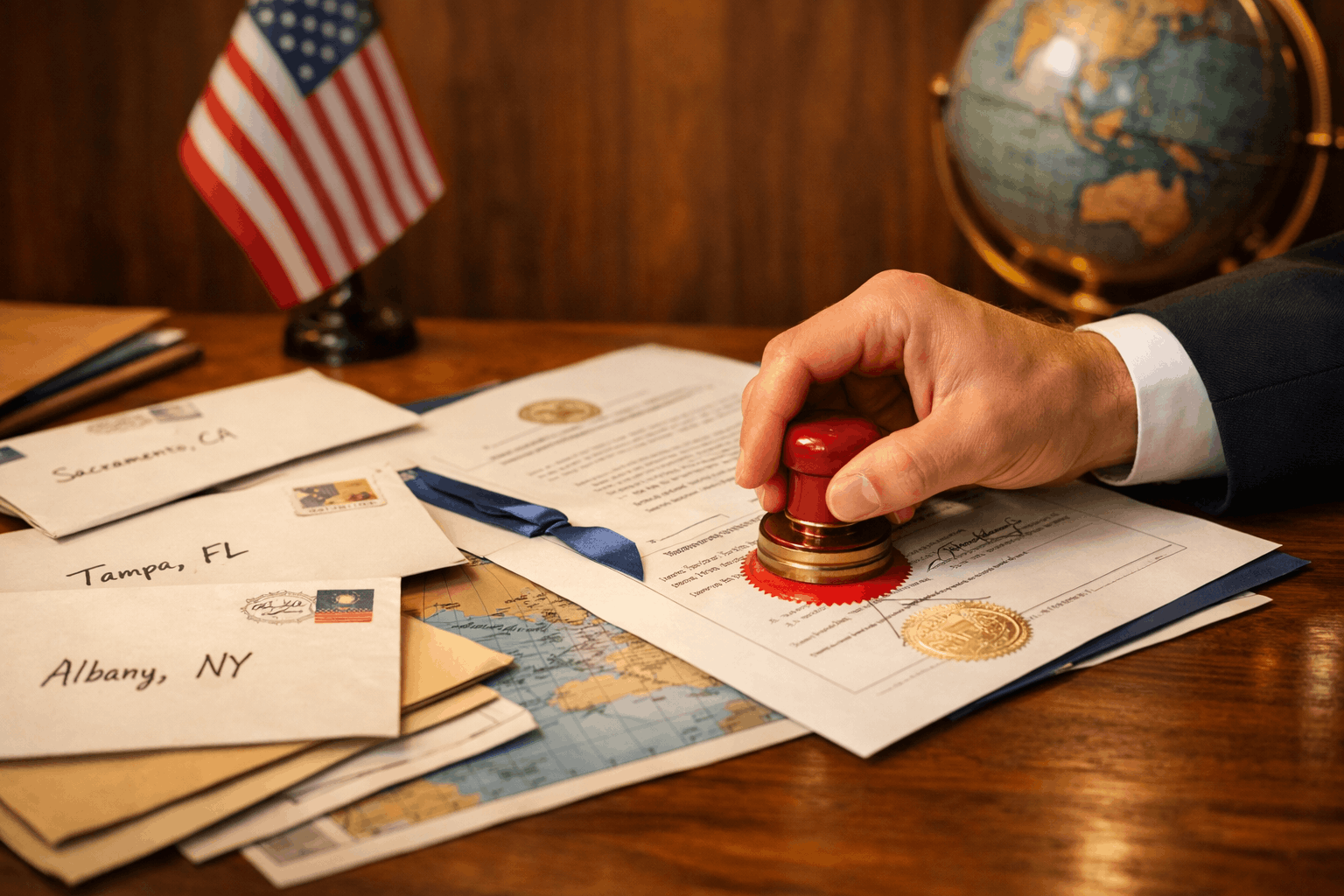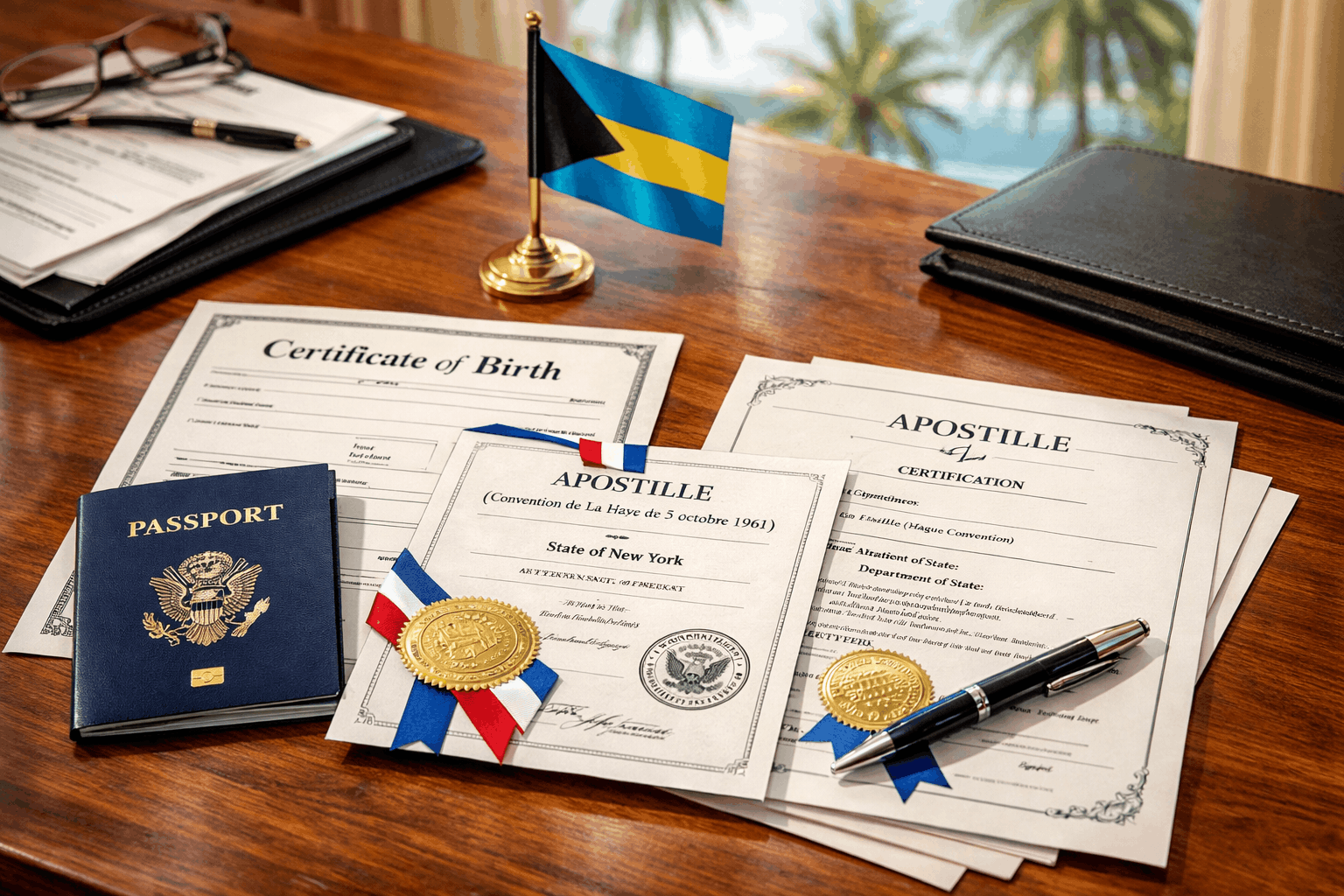
How to Apostille U.S. Documents for Portugal
Preparing official documents for international use can be confusing, especially if you’re moving to Portugal from the US. For official purposes in Portugal, including visa applications, academic pursuits, or managing property, U.S. documents are accepted by Portuguese authorities only after being correctly authenticated through an apostille. This authentication verifies the genuineness of your documents and confirms their legal recognition for international use.
Through this article, you’ll learn when apostilles are required, how to prepare your U.S. documents for Portugal, how long the process takes, and why professional help can save time and prevent delays.
When You Need an Apostille for Portugal
If you’re moving to Portugal, different offices may ask for various authenticated records, from birth certificates to financial statements. Below are the most common scenarios where an apostille is needed.
Personal and Family Matters
When dealing with marriage registration, divorce, or child documentation in Portugal, U.S.-issued civil records must carry an apostille. This includes birth, marriage, and divorce certificates, along with court judgments that verify family status.
If you’re registering a child’s birth or updating marital records in Portugal, these documents must be certified copies issued by the appropriate U.S. vital records office. Portuguese civil registries will not accept uncertified or notarized copies. Before mailing your paperwork, confirm that the seal and signature of the issuing official are clearly visible. Proper apostillation ensures these family records are accepted without further legalization.
Immigration, Residency, and Long-Stay Visas
For those pursuing residency or visas such as the D7, Digital Nomad, or Golden Visa, authenticated documents are mandatory. Portuguese consulates usually require apostilled FBI background checks, proof of income, and sometimes bank or employment letters.
An apostille for Portugal verifies that each document’s seal and signature are authentic. For example, your FBI background check must be authenticated by the U.S. Department of State, while state-issued papers go through the relevant Secretary of State. Submitting apostilled documents avoids delays or rejections during your visa application.
Education and Employment in Portugal
If you want to work or study abroad, institutions and employers in Portugal may ask for apostilled diplomas, transcripts, or professional certificates. These documents verify your education and credentials.
Before applying for the apostille, confirm that each paper has the original signature of the registrar, dean, or licensing authority. This ensures that the Portuguese institution will accept your credentials without question. Many applicants use apostille services for Portugal to handle this process, especially when multiple documents are involved.
Business and Property Transactions
Investors, business owners, or property buyers often need notarized and apostilled paperwork for legal use in Portugal. Contracts, articles of incorporation, and powers of attorney must all be authenticated to hold legal weight abroad.
For instance, if you grant someone Power of Attorney to manage a property purchase in Lisbon, that document must be signed before a U.S. notary and then apostilled. Without this certification, the transaction cannot proceed legally in Portugal.
How to Get Your U.S. Document Ready for Portugal
Apostilling is a straightforward process once you know the sequence. The goal is to ensure that every document meets the specific requirements of both the U.S. and Portuguese authorities.
Confirm You Have the Right Type of Document
Your document must be an original or an officially certified copy. Records such as marriage and birth certificates have to be issued directly by a state office or the appropriate county clerk. Photocopies or notarized scans are not acceptable unless officially certified.
If you’re unsure, contact the issuing office to confirm authenticity before proceeding with the apostille document for Portugal. This prevents rejections later and keeps the process efficient.
Check Whether Notarization Is Needed
Certain papers (affidavits, business contracts, letters, etc )need notarization before apostille. The notary verifies the identity of the signer and confirms that the document was signed freely and without duress. Once notarized, it becomes eligible for authentication by the Secretary of State.
Government-issued records like birth certificates or court documents usually don’t require notarization since they already carry official seals. If you’re preparing multiple document types, make a list and note which ones need notarization to stay organized.
Identify the Correct Apostille Authority
The next step is identifying where to submit your document:
- State-level documents (vital records, diplomas, notarized forms) go to the Secretary of State in the state of issuance.
- Federal-level documents (FBI background checks, federal court papers) are apostilled by the United States Department of State’s Office of Authentications located in Washington, D.C.
This distinction is key. Sending a state document to the federal office or vice versa will lead to rejection. If you’re unsure which level applies, professional apostille services for Portugal can confirm the correct route.
Submit the Apostille Request
Once you’ve verified everything, it’s time to submit. You can submit in person, by mail, or through a courier. Include the original document, a completed application form, and payment. Most offices also ask you to specify the destination country so the apostille is formatted correctly.
In-person requests tend to be faster, but mailing is convenient if you live outside the issuing state. Some offices allow you to request expedited service for an additional fee.
Verify the Document for Use in Portugal
After receiving the apostille, confirm that it’s attached securely to the document and that all seals and signatures are visible. Never separate the apostille from the document, as this will void its authenticity.
Once attached, your paper becomes legally recognized across Portugal and other Hague Convention countries. Keep soft and hard copies of your records in case Portuguese authorities request duplicates later.
Apostille Timing and Fees for Portugal
The turnaround time and associated fees are determined by the nature of your document and its place of issuance. Planning early ensures your paperwork is ready before your visa or registration deadline.
Typical Processing Times
At the state level, most apostilles take one to three weeks, depending on office workload and whether you apply in person or by mail. For instance, the Authentication of federal documents, like the FBI background check, generally requires a processing period of four to six weeks.
If you’re under time pressure, a private courier can often shorten turnaround to just a few business days. If you’re moving to Portugal, it’s strongly advised to start the apostille process at a minimum of two to three months ahead of your scheduled move.
Service Fees and Mailing Costs
Fees vary across states but usually range between $10 and $20 per document. The U.S. Department of State charges $20 for each federal apostille. In addition, you’ll need to budget for postage, courier delivery, and optional expedited handling.
If you use an agency, expect additional service fees based on the number of documents and speed of processing. While this adds to the cost, it can save you significant time and prevent costly errors in your Portugal immigration paperwork.
Apostille and Translation Requirements in Portugal
Portugal requires that all foreign documents — even after being apostilled — be presented in Portuguese. Understanding these translation rules prevents unnecessary rejection or delays once you arrive.
Do You Need a Portuguese Translation?
Yes. All U.S. documents used in Portugal require professional translation. This includes the apostille itself. Without proper translation, your paperwork will not be accepted by public offices or universities.
Make sure both the original and translated copies are submitted together. This ensures the Portuguese authority can review both versions side by side.
Certified vs. Sworn Translator
In Portugal, translations for official use must be done by a sworn translator (tradutor juramentado) accredited by Portuguese authorities. In the United States, certified translators familiar with Portuguese legal terminology can prepare the translation before apostillation if required.
When preparing your apostille for Portugal, verify that the translator’s credentials meet Portuguese government standards. Using an uncertified translator can result in rejection even if the translation is accurate.
Where to Authenticate a Translated Document
If the translation is done in the U.S., have it notarized and apostilled as a separate document. If completed in Portugal, it can be validated directly by the local notary or Portuguese consulate. Always confirm which jurisdiction applies before proceeding, as requirements may differ based on where you intend to present the document.
Why Use a Professional Apostille Agency for Portugal
While you can handle the process independently, hiring a professional agency often saves both time and effort. These specialists know how to navigate federal and state rules, identify the right issuing authority, and arrange for translation and shipping.
For Americans living in Portugal, this assistance is particularly valuable. Agencies can retrieve certified copies, handle apostilles across multiple states, and deliver fully translated documents ready for submission to consulates or immigration offices.
They also help track progress, verify details, and resolve issues quickly if a document gets rejected. For complex applications such as the Golden Visa, using professional help ensures everything is completed in the correct order.
Stay Organized, Stay Compliant
Obtaining an apostille may seem technical, but it becomes easier after you’re familiar with the steps. Every official U.S. document, from birth certificates to business papers, must be properly authenticated before it can be recognized by Portuguese authorities.
Begin early, use certified copies, and meticulously go through the requirements, such as notarization or translation needs. Whether you manage the process yourself or hire experts, following each step carefully ensures your documents are accepted without delay.
FAQ
Can I use the same apostilled document for multiple Portuguese institutions?
Yes, provided the document is still current and has not been damaged or altered. However, some organizations may require newly issued copies for administrative reasons.
How long is an apostille valid for Portugal?
In a technical sense, an apostille does not expire. However, Portuguese authorities may ask for documents issued within the last 6–12 months, especially for civil records or visa applications.
Do online notarizations work for apostilles?
Some states accept online notarizations, but not all. Confirm with the issuing Secretary of State before using a remote notarization for an apostille for Portugal.
What if my document was issued several years ago — do I need a new copy?
In many cases, yes. Vital records or court orders older than five years may need reissuance to meet Portuguese standards.
Can I get an apostille if I already live in Portugal?
Yes. You can mail your documents to the U.S. or work through a professional agency that handles apostilles on behalf of clients living abroad.
Do I need to apostille income or bank documents for my D7 visa?
Yes. If you’re proving income or financial stability, your bank statements or employment letters may need notarization and apostille to be accepted by the Portuguese consulate.
Will the apostille be accepted by SEF during residency renewal?
Yes, provided it’s properly issued and translated into Portuguese. Always verify with SEF if updated versions are required at the time of renewal.
Can I use a digital apostille when applying online for a visa in Portugal?
Electronic apostilles (e-apostilles) are increasingly accepted by consulates and Portuguese agencies, but check first to confirm the receiving office allows digital submissions.





